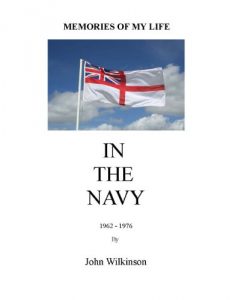Review by Nik Morton, Author of "The Tehran Transmission"
This book does what it says on the cover and gives the reader in Wilkie's own words his memories from this fifteenth birthday up to the time he left the Royal Navy just over thirteen years later. He makes no apologies for the "bad" language, stating that's how it was. If readers can accept this aspect - the earthy language - then this book should appeal to two sections of people, those who are curious about what naval life was like forty two years ago, and also those who experienced that life or similar. It's bound to appeal to expat matelots, I'm sure
Like Wilkie, I'm a Geordie and I too joined the RN in the 1960's, but I never met Wilkie - until now, through his words. The style is basic chat and jocular, so that by the end I felt I knew the man quite well, having lived with hims through the vicissitues of a colourful and varied naval life. I joined the RN at the same Newcastle upon Tyne recruiting office some four years after Wilkie, so some of his memories evoked my own. This I think will be true of other readers too.
Wilkie preferred seagoing ships to brick ones, and for most of his naval career he got his wish,. His drafts - or postings in non-naval parlance - included HM Ships Hampshire, Cavendish, Devonshire, President, Bulwark, Arlingham, Collingwood and Sirius. Over the years, he traveled to far-flung places such as Singapore, Hong Kong, Japan, Malta, Greece, Italy, South Africa, Gibraltar, Poland, Russia, Aden, Philippines and Australia. These were the days when Great Britain had a substantial navy and ships visited foreign ports to show the flag. Now Britain had dropped the "Great", the navy has shrunk, there's plenty of sea-time but few foreign visits, and none of our government politicians seem interested in showing off the flag in case it offends someone..
On the surface, Wilkie's naval life seems one long round of drinking, chasing women, playing football and runs ashore, This is not the case, of course. He points out that in between all those foreign visits there were long stretches of hard work and seagoing exercised in conditions no health and safety conscious trade unionist would sanction. Beneath the surface, Wilkie's book touches on the lasting friendship with old pals from that period, including several ex girlfriends. He fondly remembers friends and family, some sadly departed, and equally recalls a very few individuals he disliked intensely.
That all changed, however, when he met and married his blonde Wren, Drink and soccer were still viable options, but that was all. Dog lovers will warm to one member of HMS Arlingham's ship's company, Tramp a black mongrel complete with dog-tags and his own 'uniform'.
In conclusion,ignore the language and just listen to the man's fond memories of people and a time now gone.
Nick Morton Author of "The Tehran Transmission"( A spy thriller about Iran in 1978)
This book does what it says on the cover and gives the reader in Wilkie's own words his memories from this fifteenth birthday up to the time he left the Royal Navy just over thirteen years later. He makes no apologies for the "bad" language, stating that's how it was. If readers can accept this aspect - the earthy language - then this book should appeal to two sections of people, those who are curious about what naval life was like forty two years ago, and also those who experienced that life or similar. It's bound to appeal to expat matelots, I'm sure
Like Wilkie, I'm a Geordie and I too joined the RN in the 1960's, but I never met Wilkie - until now, through his words. The style is basic chat and jocular, so that by the end I felt I knew the man quite well, having lived with hims through the vicissitues of a colourful and varied naval life. I joined the RN at the same Newcastle upon Tyne recruiting office some four years after Wilkie, so some of his memories evoked my own. This I think will be true of other readers too.
Wilkie preferred seagoing ships to brick ones, and for most of his naval career he got his wish,. His drafts - or postings in non-naval parlance - included HM Ships Hampshire, Cavendish, Devonshire, President, Bulwark, Arlingham, Collingwood and Sirius. Over the years, he traveled to far-flung places such as Singapore, Hong Kong, Japan, Malta, Greece, Italy, South Africa, Gibraltar, Poland, Russia, Aden, Philippines and Australia. These were the days when Great Britain had a substantial navy and ships visited foreign ports to show the flag. Now Britain had dropped the "Great", the navy has shrunk, there's plenty of sea-time but few foreign visits, and none of our government politicians seem interested in showing off the flag in case it offends someone..
On the surface, Wilkie's naval life seems one long round of drinking, chasing women, playing football and runs ashore, This is not the case, of course. He points out that in between all those foreign visits there were long stretches of hard work and seagoing exercised in conditions no health and safety conscious trade unionist would sanction. Beneath the surface, Wilkie's book touches on the lasting friendship with old pals from that period, including several ex girlfriends. He fondly remembers friends and family, some sadly departed, and equally recalls a very few individuals he disliked intensely.
That all changed, however, when he met and married his blonde Wren, Drink and soccer were still viable options, but that was all. Dog lovers will warm to one member of HMS Arlingham's ship's company, Tramp a black mongrel complete with dog-tags and his own 'uniform'.
In conclusion,ignore the language and just listen to the man's fond memories of people and a time now gone.
Nick Morton Author of "The Tehran Transmission"( A spy thriller about Iran in 1978)






